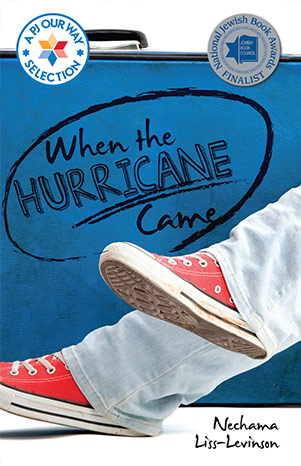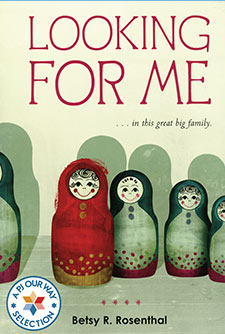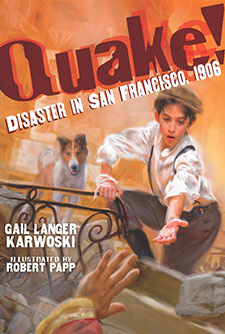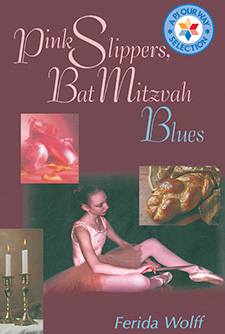When the Hurricane Came
Nine-year-old Gertie's life changes dramatically when Hurricane Katrina comes to town. It seems like she's lost everything. Will she ever feel at home again?
Average Rating
( hint: Login to leave a review! )
72 Reviews
Leave Review
What the Book is About
Jewish Content & Values
Positive Role Models
Content Advisory
Talk it Over!
More for You
What the Book is About
Before Hurricane Katrina hit New Orleans, nine year-old Gertie, her mom, and her brother went to stay with Gertie’s Aunt Charlene and Uncle Mike until the danger passed. When they left their home, they had no idea that they would never see it again! Gertie tries hard to adjust to a new school and new friends in Memphis, and to come to terms with losing her home and possessions. She also really misses her dad, who stayed behind to serve as a doctor in the devastated city. When Gertie returns to New Orleans, she has a better understanding of what is important in life, which transforms her experience of loss into one of determination to repair and rebuild her home.
Jewish Content & Values
- Tzedakah (charity) is an overarching theme. In a profound moment, Gertie realizes that the loss of her home has transformed her from a “giver” of tzedakah to a recipient. When she returns home after the hurricane and discovers that there are many who have suffered greater losses than she has, Gertie is inspired to launch a book-donating campaign for the New Orleans Public Library.
- Jewish Holidays and Customs: Celebrating Jewish holidays and customs as a family in Memphis and linking the meaning of each holiday to her own experiences provides some comfort to Gertie, as she tries to make sense of her life after Hurricane Katrina. During the Passover Seder back in New Orleans, Gertie is asked what she would take with her if she had to flee Egypt; Gertie thinks about what she values the most and answers, “my family.”
- Birkat HaGomel is the traditional Jewish prayer of thanksgiving when one has passed safely through a life-threatening situation. Gertie recites this prayer with her family and all the people from New Orleans who are present in her aunt and uncle’s synagogue in Memphis.
Positive Role Models
- Gertie’s Aunt Charlene provides Gertie with a lot more than just a place to live after the hurricane. Aunt Charlene reassures Gertie that her dad is not only okay, he is a hero! When Gertie makes secret plans to go back to New Orleans, it is Aunt Charlene who helps Gertie’s mom understand why Gertie wants to go and how best to address Gertie’s scared, sad feelings.
- Gertie's dad Marc is a doctor in New Orleans who stays behind to help. When he finally joins his family, he describes how he stood for 12 hours helping a woman breathe on a respirator that he pumped by hand.
- Rabbi Weiss is the principal of the school that Gertie attends in Memphis. When Gertie is understandably troubled by the story of Noah and the flood, it is Rabbi Weiss who listens to her questions and invites her to help him with the school newspaper.
Content Advisory
- Gertie sees pets on TV that were abandoned when the hurricane came; she later sees on the internet that these pets died.
- Gertie and her family have no way of contacting her dad and are worried about him. He does eventually return.
- Gertie’s Uncle Mike gives her a calendar, and Gertie marks each day that passes with an “x”, which reminds her of the “x"s that police in New Orleans put “on front doors to houses where people had drowned.”
Talk it Over!
- When the hurricane comes, Gertie doesn’t have a lot of time to gather the things she wants to take with her. If you were in Gertie’s situation, what would you take with you?
- After Gertie’s friends share some uncharitable comments that another child in the class made about her, Gertie comes to the conclusion that “it isn’t always so friendly to tell your friend something that another friend said about them.” Do you agree with her? Why or why not?
More for You
The Birkat HaGomel is a blessing of thanksgiving. It was originally recited as part of a Temple sacrifice. Today, it is said aloud as a prayer in the presence of fellow congregants by someone who has survived a serious illness, childbirth, or a dangerous situation. The survivor traditionally says, "Blessed are You, Lord our God, King of the Universe, Who bestows good things upon the unworthy, and has bestowed upon me every goodness." Fellow congregants then respond, "Amen. God who has bestowed upon you every goodness, may God [continue to] bestow upon you every goodness."
What the Book is About
What the Book is About
Before Hurricane Katrina hit New Orleans, nine year-old Gertie, her mom, and her brother went to stay with Gertie’s Aunt Charlene and Uncle Mike until the danger passed. When they left their home, they had no idea that they would never see it again! Gertie tries hard to adjust to a new school and new friends in Memphis, and to come to terms with losing her home and possessions. She also really misses her dad, who stayed behind to serve as a doctor in the devastated city. When Gertie returns to New Orleans, she has a better understanding of what is important in life, which transforms her experience of loss into one of determination to repair and rebuild her home.
Jewish Content & Values
Jewish Content & Values
- Tzedakah (charity) is an overarching theme. In a profound moment, Gertie realizes that the loss of her home has transformed her from a “giver” of tzedakah to a recipient. When she returns home after the hurricane and discovers that there are many who have suffered greater losses than she has, Gertie is inspired to launch a book-donating campaign for the New Orleans Public Library.
- Jewish Holidays and Customs: Celebrating Jewish holidays and customs as a family in Memphis and linking the meaning of each holiday to her own experiences provides some comfort to Gertie, as she tries to make sense of her life after Hurricane Katrina. During the Passover Seder back in New Orleans, Gertie is asked what she would take with her if she had to flee Egypt; Gertie thinks about what she values the most and answers, “my family.”
- Birkat HaGomel is the traditional Jewish prayer of thanksgiving when one has passed safely through a life-threatening situation. Gertie recites this prayer with her family and all the people from New Orleans who are present in her aunt and uncle’s synagogue in Memphis.
Positive Role Models
Positive Role Models
- Gertie’s Aunt Charlene provides Gertie with a lot more than just a place to live after the hurricane. Aunt Charlene reassures Gertie that her dad is not only okay, he is a hero! When Gertie makes secret plans to go back to New Orleans, it is Aunt Charlene who helps Gertie’s mom understand why Gertie wants to go and how best to address Gertie’s scared, sad feelings.
- Gertie's dad Marc is a doctor in New Orleans who stays behind to help. When he finally joins his family, he describes how he stood for 12 hours helping a woman breathe on a respirator that he pumped by hand.
- Rabbi Weiss is the principal of the school that Gertie attends in Memphis. When Gertie is understandably troubled by the story of Noah and the flood, it is Rabbi Weiss who listens to her questions and invites her to help him with the school newspaper.
Content Advisory
Content Advisory
- Gertie sees pets on TV that were abandoned when the hurricane came; she later sees on the internet that these pets died.
- Gertie and her family have no way of contacting her dad and are worried about him. He does eventually return.
- Gertie’s Uncle Mike gives her a calendar, and Gertie marks each day that passes with an “x”, which reminds her of the “x"s that police in New Orleans put “on front doors to houses where people had drowned.”
Talk it Over!
Talk it Over!
- When the hurricane comes, Gertie doesn’t have a lot of time to gather the things she wants to take with her. If you were in Gertie’s situation, what would you take with you?
- After Gertie’s friends share some uncharitable comments that another child in the class made about her, Gertie comes to the conclusion that “it isn’t always so friendly to tell your friend something that another friend said about them.” Do you agree with her? Why or why not?
More for You
More for You
The Birkat HaGomel is a blessing of thanksgiving. It was originally recited as part of a Temple sacrifice. Today, it is said aloud as a prayer in the presence of fellow congregants by someone who has survived a serious illness, childbirth, or a dangerous situation. The survivor traditionally says, "Blessed are You, Lord our God, King of the Universe, Who bestows good things upon the unworthy, and has bestowed upon me every goodness." Fellow congregants then respond, "Amen. God who has bestowed upon you every goodness, may God [continue to] bestow upon you every goodness."




